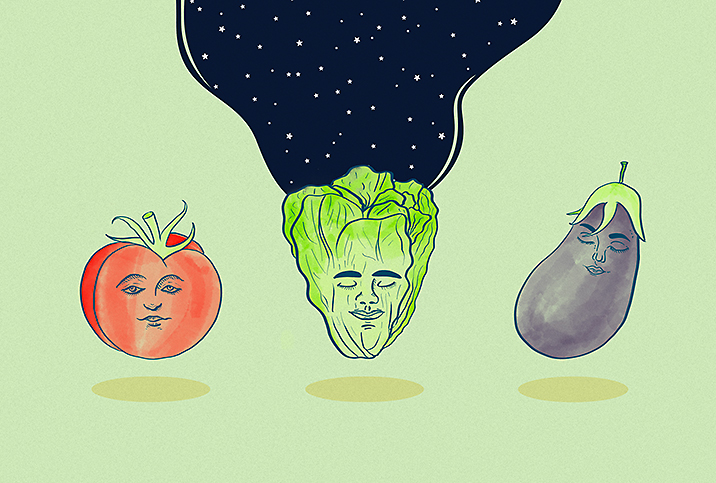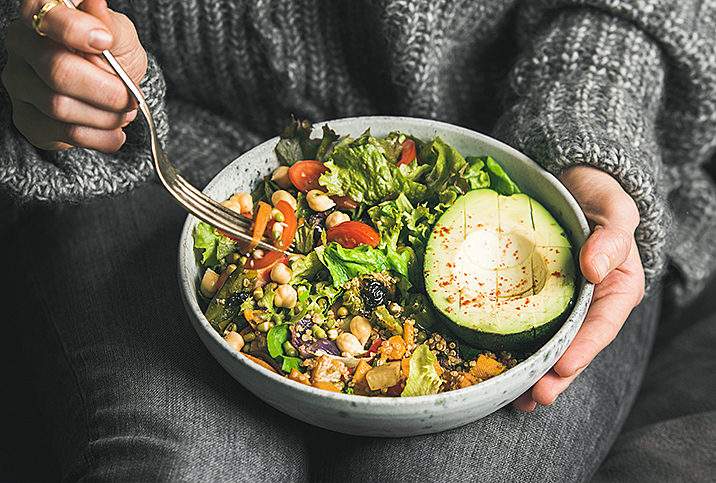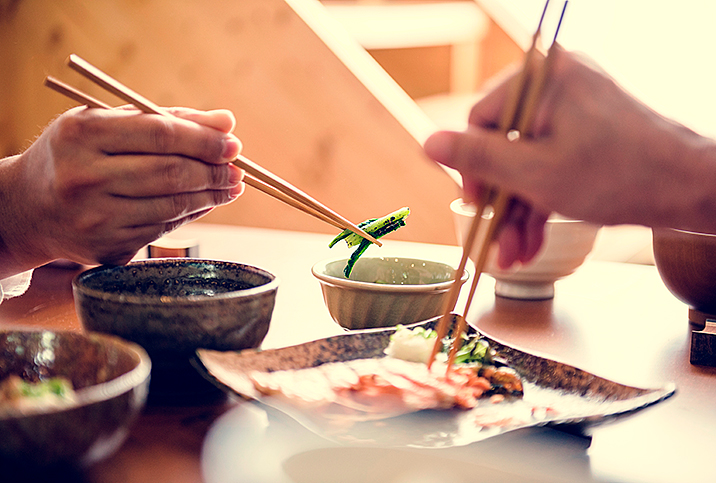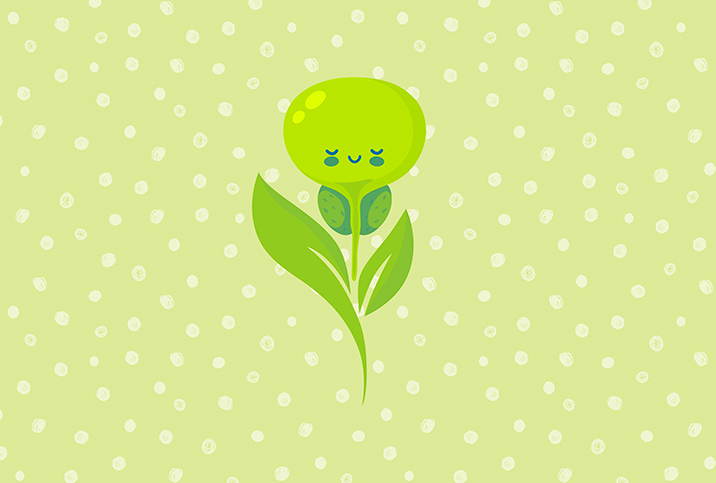9 Tips for Going Plant-Based

Whether for animal rights, health, environmental conservation or even an overconfident New Year's resolution in the hopes of being more like Beyoncé, there are numerous reasons to consider eating less meat and more plants.
As someone who's been vegan or vegetarian for more than 15 years, I can confidently make two observations: It isn't always easy, but it's well worth it.
If you're considering adopting a more plant-focused diet in 2024, here are some tips to turn you in the right direction.
Types of meatless diets
First, you'll need to decide which type of plant-based diet to undertake.
Vegan diets are the most restrictive in that they exclude all animal products, including meat, poultry, fish, dairy, eggs, gelatin and honey.
Vegetarian diets are a good gateway to a meatless diet for those who are foraying into newfound territory. Vegetarianism is not as rigid as veganism—it eliminates all meat and poultry while permitting some animal-based products. Under the vegetarian umbrella are:
- Lacto-ovo vegetarian, the most popular, which incorporates eggs and dairy.
- Lacto vegetarian, which includes dairy but not eggs.
- Ovo vegetarian, which includes eggs but not dairy.
There is also the pescatarian diet, which eliminates all meat except seafood. And finally, there are plant-forward and flexitarian diets, which allow all foods in moderation, with an emphasis on plant-based ones.
The benefits of eating more plants
"Going vegan is great protection for so many diseases, such as diabetes, heart disease, high cholesterol and even genetic diseases like hemochromatosis (iron overload syndrome)," said Ellie Busby, a member of the British Association of Nutritional Therapists (mBANT), plant-based nutritionist and founder of Vojo, a personalized plant-based nutrition company.
Busby noted that ditching dairy can give vegans and ovo vegetarians a leg up on lacto and lacto-ovo vegetarians, too, because according to the National Institute of Diabetes and Digestive and Kidney Diseases, about 68 percent of the world's population is lactose intolerant.
"Many people struggle with gut issues without realizing they are lactose intolerant," Busby said. "On top of that, dairy consumption is associated with an increased risk of diabetes, heart disease and cancer. Dairy can also cause mucus buildup, worsen symptoms of asthma and much more."
Research, including a review published in the Journal of Geriatric Cardiology, indicated a vegan diet can reduce blood sugar levels and improve kidney function. This may prevent type 2 diabetes and assuage symptoms in people who already have the disease.
A plant-forward diet can support a healthy gut microbiome, too. According to a review published in the International Journal of Molecular Sciences and another in the journal Nutrients, the state of the gut microbiome can substantially affect overall physical and mental health.
'Going vegan is great protection for so many diseases.'
"The main benefit of including more veggies in your life is not only to get more vitamins, minerals, antioxidants, and polyphenols but, from a gut-health perspective, vegetables and plant-based foods are the best source of fiber, which provides food for our bacteria inside our gastrointestinal tract to feast on," said Evie Whitehead, mBANT, a registered qualified nutritional therapist.
Whitehead noted bacteria ferment the starchy fibers we don't digest and produce B vitamins and a byproduct called short-chain fatty acids, which feed the gut-lining cells.
"The gut lining is a critical first line of defense that keeps food particles inside the gastrointestinal tube to be further broken down or eliminated, and against bacteria and pathogens—that is, nonhuman particles—from entering our bloodstream," she added.
Whitehead also explained the gut lining houses about 70 percent of the immune system. Along with feeding beneficial gut bacteria, the abundance of antioxidants, vitamins, minerals and phytochemicals in a plant-based diet support immune function.
Of course, there are ethical benefits for animal welfare and environmental conservation. In addition to rejecting the mistreatment of animals, studies show adopting a plant-forward diet may be one of the best ways to contribute to a more sustainable planet.
Meat and dairy have significantly higher water footprints than grains, veggies and beans. Producing just one pound of beef, for example, requires 2,000 to 8,000 gallons of water, whereas it only takes 302 gallons to make a pound of tofu or 290 gallons to produce a pound of unprocessed oats. By eliminating meat, the average omnivore could reduce their water footprint by up to 55 percent.
Tips for prospective vegetarians and vegans
1. Start slow
It may be tempting to go all-in from day one, but going too hard too fast can make the switch harder than it needs to be. Instead, experts advise taking it slow, especially if animal products are currently a significant part of your diet. For instance, you might want to cut out red meat first, then poultry, and fish a week or two after that. Or, you might want to try going veg part-time, whether that's one plant-based meal a day, "Meatless Mondays," or a "three days on, four days off" schedule.
"Understand why you want to give it a go and outline a plan for you that fits your lifestyle," said Monika Mateja, a certified health coach and vegan naturopathic chef. "Maybe going vegan all day every day is not possible right now but will be in the near future, and that's okay."
Transitioning gradually allows your body to adjust to the increase in fiber (start looking forward to more bathroom breaks). Plus, it gives you time to find suitable substitutes as you wean yourself off certain foods.
2. Find substitutes
It's tough to replicate the texture of meat or the taste of real, quality cheese. Realistically, it's unlikely you'll find something that perfectly mirrors its animal-based counterpart. That isn't necessarily bad, but it may take some getting used to.
Try finding some substitutes you enjoy and making these a key part of your diet to ease the transition. From "pulled pork" made of jackfruit to "chicken" made of seitan, there are numerous products on the market resembling meaty favorites.
Other go-to savory subs for meat and cheese, respectively, are portobello mushrooms and nut "cheese" or nutritional yeast.
3. Keep an open mind
One of the biggest misconceptions about meatless diets is they're intensely restrictive. Another is that they're something new.
In reality, numerous cultures around the globe have practiced plant-forward culinary customs for thousands of years, including groups in Ethiopia, India and the Middle East. And besides time-tested favorites like hummus, falafel, lentil stew, stir-fries and tofu curries, there are vegan versions of just about every type of food nowadays—snacks and treats included.
With the help of the internet and some imagination, the options are limitless. Use your diet switch-up as an excuse to expand your horizons, try new recipes and get creative in the kitchen.
4. Don't assume all vegan food is healthy
While you could be vegan and eat pasta and plant-based "cheese" pizza for dinner every night, doing so won't do your health any favors.
There's nothing wrong with treating yourself and eating not-so-healthy foods in moderation. Just bear in mind a vegan cookie doesn't necessarily contain less sugar than one made with dairy, and not all vegan cheese is lower in sodium or saturated fat. To reap the full health benefits of your new diet, aim to make plants the star of every meal.
"The saying, 'If it was made in a plant, don't eat it, and if it is made from a plant, eat it,' is a good rule of thumb," said Whitehead. "The market is saturated with ultra-processed, plant-based options, making this an easy area to get wrong."
5. Consider supplements
A healthy, balanced diet is the best source of nutrients, and it is possible to get most, if not all, essentials from a plant-based diet. Some nutrients—including fiber, potassium, magnesium, folate, vitamins A, C and E, and antioxidants—are even more abundant when you eat mostly plants.
Having said that, some vegetarians and vegans can benefit from one or more supplements.
Vitamin B12 is a big one, as it plays a crucial role in nerve functioning and metabolism. It's primarily found in animal products, including meat and eggs, although several fortified plant-based products, including nutritional yeast, fortified cereals, milk and yogurts, nori seaweed and tempeh, are also good sources.
"Most people, vegan/vegetarian or not, should be supplementing B12 due to modern food handling/sterilization practices," explained Hillary "Nesse" Cannon, a nutritionist and founder of BarreFly London. "B12 actually comes from the soil, so animals used to ingest the soil along with grass, etcetera, then convert the B12 into a usable form for humans, and then we would get it from eating the animal. Unfortunately, with all the factory farming these days, most animals are fed processed food that doesn't come from the soil. As such, they, too, are deficient in B12, so eating them does us no good."
The Vegan Society recommends a supplement of 10 micrograms daily for anyone who doesn't get sufficient vitamin B12 from their diet. Omega-3 fatty acids are another essential.
"It's recommended that vegans consume an Omega-3 source daily. This includes two tablespoons of flaxseed or chia seed or a portion—say, 30 grams—of walnuts daily," said Katherine Kimber, a registered dietitian and founder of Nude Nutrition, adding that algae oil supplements of 500 milligrams per day can also fulfill the requirement.
Other nutritional elements commonly lacking in vegetarian and vegan diets include iron, zinc, selenium and calcium. Plant-based sources of iron include blackstrap molasses, tofu and tempeh, spinach, beans (especially soy, kidney and lima), Swiss chard and lentils. Beans, nuts and whole grains can provide necessary amounts of zinc, while soy products, kale, figs, almonds and fortified plant milks and yogurts can supply calcium. Grains, Brazil nuts, soybeans and tofu are a few plant-based sources of selenium.
6. Get plenty of plant-based protein
Despite the widespread misconception to the contrary, it isn't necessarily challenging to get sufficient plant-based protein. However, again, there might be a slight learning curve.
Protein needs vary from one person to another, but generally, the recommended daily intake for a sedentary person is 0.36 grams per pound of body weight. Besides faux meats, other good sources include legumes, beans, pulses, quinoa, kale, spinach, tofu, almonds and walnuts, sunflower and pumpkin seeds, tempeh and spirulina.
Try to incorporate at least one protein source into every meal and snack to ensure you're getting what your body needs.
7. Plan ahead
A bit of planning can go a long way in ensuring you're meeting your nutritional quotas without spending a small fortune on groceries. Plants generally cost less than animal products—just compare the price of tofu to most types of meat, for example. But certain products, like faux meats and cheeses, can be pricey. Buying a food processor and learning to DIY things like bean burgers, minced "meat," and "cheese" sauces is one of the best ways to save.
"To ensure nutritionally balanced meals—in any diet, to be honest—planning and preparation is the key," Mateja said. "Of course, if you buy nuts, superfoods, etc., it all adds up, so it is a matter of priority and giving up something else and keeping your diet varied but simple. When I started, I checked all my cupboards and replenished them slowly over time with food that is vegan and I can cook with."
"I always encourage my clients to put aside time each week to plan meals in advance so that you can see a clear roadmap ahead for shopping, prepping and avoiding waste," Whitehead explained.
8. Ditch the label (if you want to)
Although accurate labels are crucial for food packaging, they're far less so for people. If categorizing yourself as "vegetarian" or "vegan" feels too restrictive, don't worry about it.
"If you're naturally eating more plant-based or vegan, to me, there doesn't seem to be a need to put yourself in a box," Kimber said. "Our taste preferences and food availability change over time, so I would recommend people keep flexibility in mind. That doesn't mean one day you are 100 percent vegan, then the next you aren't. It just means it might feel more helpful to have fewer rules in place."
9. Be kind to yourself
Nobody is perfect, nor is your diet a reflection of your character. There's no need to beat yourself up for eating a slice of cheese pizza at a friend's birthday party or chowing down on a burger at a barbecue. Experts say incorporating flexibility into your new diet from the get-go can make it more sustainable and rewarding.
"Be kind to you," Cannon explained. "Veganism is about kindness—or it's supposed to be—and that starts with being kind to yourself. If you mess up and order something with butter, eat it and make a mental note to avoid it next time. If you are desperately craving chicken and it's driving you crazy, eat it. Ease into this transition and don't self-flagellate if you fall off the wagon. Experiment, be open-minded, explore this new world, and have fun with it. This isn't supposed to be a chore. It's supposed to be a positive change, so let it be that in your life."


















